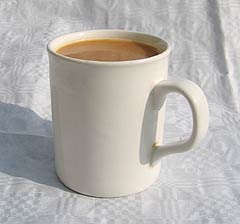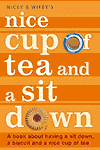Nice NewsYour up to the minute source for news in the fast moving world of tea and sit downs. If you have some nice news that you think we should know about, it might be that you've spotted a long lost biscuit, or maybe you've found somewhere that does splendid tea and sits downs, then why not email us at the usual address. | |
Have some tea and don't get stressed outWednesday 4 Oct 2006 Reporter: Nicey |
 |  | We all know that a good cuppa can sort us out when things are getting a bit hectic. Now a new study by University College London and Unilever, the makers of PG Tips, used special made up tea drinks to investigate the their calming effects on some blokes who were having a bad day. The drinks, designed to mask the taste and smell of tea in case that was comforting in itself, still contained caffeine but only half had proper tea in them. | The study found that people who drank tea were able to manage their stressors more quickly than those who drank a fake tea substitute. Furthermore, the study participants - who drank a black tea concoction four times a day for six weeks - were found to have lower levels of the stress hormone cortisol in their blood after a stressful event, compared with a control group who drank the fake or placebo tea for the same period of time.
The study also found that blood platelet activation – linked to blood clotting – was lower in the tea drinkers, and that this group also reported a greater degree of relaxation in the recovery period after the task.
Kate Ostle, PG Tips tea says: “Many consumers value their cuppa seeing it as a traditional remedy for stress. Tea has been reputed to having a role in perking up the nation for years and now this new research puts some science behind it. Over 150 million cups of tea are consumed per day in the UK alone, we hope the study encourages more people to put the kettle on and enjoy tea.”
Dr Jane Rycroft, Beverages Project Manager from Unilever says: "This study suggests that regular black tea consumption may help improve the way your body responds to daily stressors. The levels of stress we experience do not appear to be reduced, however, tea does seem to bring stress hormone levels back to normal quicker. This may have important health implications."
Professor Andrew Steptoe, UCL Department of Epidemiology and Public Health, says: “This is one of the first studies to assess tea in a double-blind placebo controlled design – that is, neither we nor the participants knew whether they were drinking real or fake tea. This means that any differences were due to the biological ingredients of tea, and not to the relaxing situations in which people might drink tea, whether they were familiar with the taste and liked it, and so on.
We do not know what ingredients of tea were responsible for these effects on stress recovery and relaxation. Tea is chemically very complex, with many different ingredients. Ingredients such as catechins, polyphenols, flavonoids and amino acids have been found to have effects on neurotransmitters in the brain, but we cannot tell from this research which ones produced the differences.”
The Study
In the study, 75 young male regular tea drinkers were split into two groups and monitored for six weeks. They all gave up their normal tea, coffee and caffeinated beverages, then one group was given a fruit-flavoured caffeinated tea mixture made up of the constituents of an average cup of black tea. The other group – the control group - was given a caffeinated placebo identical in taste, but devoid of the active tea ingredients. All drinks were tea-coloured, but were designed to mask some of the normal sensory cues associated with tea drinking (such as smell, taste and familiarity of the brew), to eliminate confounding factors such as the ‘comforting’ effect of drinking a cup of tea.
Both groups were subjected to challenging tasks, while their cortisol, blood pressure, blood platelet and self-rated levels of stress were measured. In one task, volunteers were exposed to one of three stressful situations (threat of unemployment, a shop lifting accusation or an incident in a nursing home), where they had to prepare a verbal response and argue their case in front of a camera.
The tasks triggered substantial increases in blood pressure, heart rate and subjective stress ratings in both of the groups. In other words, similar stress levels were induced in both groups. However, 50 minutes after the task, cortisol levels had dropped by an average of 47 per cent in the tea drinking group compared with 27 per cent in the fake tea group. |
|
|
|




